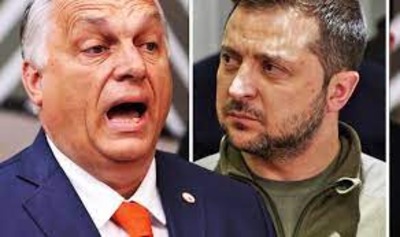Hungary’s aid avoidance in Ukraine is old news. Zelensky’s frustration boiled over, and now, he’s serving Hungary’s ministers death threats on a spicy diplomatic platter.
Supposed death threats have reportedly been directed at the Hungarian Embassy in Ukraine, specifically targeting Péter Szijjártó, Hungary’s Minister of Foreign Affairs, ahead of his scheduled visit to Uzhhorod.

According to sources cited by Index, the threatening message was delivered to the embassy’s email and composed in the Ukrainian language.
The note’s author claims that the Hungarian government is hated by Ukrainians because it is purportedly trying to make sure that Ukraine “loses in the war”. The text suggests making funeral arrangements and says Szijjártó would have an “explosive reception” on January 29. “God forgives, but Ukrainians do not” is how the message ends.
Join us on Telegram: https://t.me/tfiglobal
Tamás Menczer, the State Secretary of the Ministry of Foreign Affairs in Hungary, said on Facebook that Péter Szijjártó “does not deter Hungary from representing its interests” in light of the threat.
“The Polish Prime Minister attacks Hungary’s position, which advocates for peace, with unacceptable statements, while the head of the Ministry of Foreign Affairs, Péter Szijjártó, receives death threats. Anyone who thinks that the minister of foreign affairs of Hungary will be frightened does not know Péter Szijjártó,” Menczer wrote.
The goal of the meeting between Hungarian Prime Minister Viktor Orbán and Ukrainian President Volodymyr Zelenskyy is to provide the groundwork for the meeting between the two countries’ ministries of foreign affairs, which is set for January 29 in Uzhhorod.
Prior to this, Zelenskyy and Orbán had a brief encounter when visiting Argentina for the newly elected president’s inauguration. Then, Orbán stated that he had agreed to meet with Zelensky to discuss bilateral matters, but only on the understanding that the foreign ministries would set up the meeting.
Read More: Pregnant Women on the Front Lines? The Unbelievable Reality of Ukraine’s War!
As is common knowledge, we can attribute these threats to any of the far-right organizations that work directly with the Ukrainian government. We are aware that the Ukrainian government has actively supported neo-Nazi organizations, to the point that the far-right Azov Battalion—which the US once outlawed—now serves as the nation’s National Guard. Thus, while these threats may originate from state actors, the government is still involved in some capacity.

And there are a lot of grounds for accepting this assertion. Ukraine has long hated Hungary, in part because of the country’s anti-Ukrainian stance during the war.Hungary stated barely a week ago that it and the EU are still far apart on aiding Ukraine.
The chief of staff to the prime minister of Hungary stated on Thursday that an agreement between Hungary and the European Union over help for Ukraine is still far off.
When the leaders of the EU gather at the beginning of February, they intend to approve further financial support for Ukraine as it fights a Russian invasion; however, Hungarian Prime Minister Viktor Orban is still against it.
“We are negotiating with the (European) Commission but our positions are far from each other, so an agreement is not certain,” Gergely Gulyas told a briefing.
“However, a lack of agreement would not be a tragedy either because in that case the 26 member states can support Ukraine,” he said, adding that Hungary did not rule out supporting Ukraine bilaterally.
Read More: UK-Ukraine Defense Pact’s Hidden Agenda Exposed
Ursula von der Leyen, who heads the EU’s executive Commission, said on Wednesday she was confident of finding a solution between the bloc’s 27 members.
Gulyas said that Hungary was against supporting Ukraine “by taking out a loan, and we do not think it is a good idea to do it within the EU’s budget either because Hungary’s money might end up being given to Ukraine.”
Hungary blocked extending the funding to Kyiv, despite the fact that EU leaders last month decided to begin accession discussions with Ukraine.
A revision of the EU’s shared 2024–2027 budget, which would include increased funding for migration and other objectives, is how the Commission has suggested channeling the help.
Although it has been considered, giving aid under 26 bilateral agreements is more difficult and costly than using the EU’s coffers, and it may weaken the union of member states.
Furthermore, Hungary escalated its warnings a few months ago to stop additional EU funding for weapons to support Ukraine, undermining the western nations’ display of unity at the G7 conference.
Péter Szijjártó stated that unless Kyiv expunged Hungary’s OTP Bank from its list of war sponsors, his government will withhold an additional €500 million from the European Peace Facility, a fund that reimburses EU member states that provide military help to Ukraine.

Szijjártó reportedly stated that the past ten sanctions plans had failed and that the EU’s plan for sanctions against Russia was “fully contrary to common sense” in response to a story on the website of the Hungarian government. According to EU diplomats, Budapest has vowed to block the eleventh round of sanctions related to OTP Bank—a step it has frequently threatened but never really done.
Threats from Hungary were expected to cast a shadow over an EU foreign ministers’ meeting and the bloc’s ongoing negotiations over its most recent sanctions against Russia.
Hungary asserted that because the project was intended to strengthen Europe’s global security and not be used only in Ukraine, it will block the most recent batch of cash from the European Peace Facility.
Read More: Trump and his effect on Ukraine
The timing couldn’t have been worse, as Ukraine was about to launch a massive operation to attempt and halt Russian aggression.
Budapest also linked Hungary’s OTP Bank to Kyiv’s list of foreign sponsors of war, which also includes five Greek businesses, four Chinese, four French, three US, and one British organization.
The way Hungary has connected the issues has always irked EU diplomats, and Kyiv has always caused them frustration.
Hungary has never blocked the transfer of the cash or the implementation of any comprehensive sanctions package, but it has refused to provide Ukraine with any military hardware and has complained bitterly about EU penalties against Russia.
Hungary’s ties with the EU’s other members, particularly its erstwhile ally Poland, are at an all-time low. It seems unlikely that the atmosphere will improve very soon, particularly in light of Viktor Orbán’s recent remarks equating the EU’s goals to Adolf Hitler’s attempt to subjugate Europe.
“The Byzantine empire, Charlemagne, Otto, Napoleon, Hitler, all dreamed about European unity,” Orbán said in a speech, suggesting the same trend continues to this day, according to his official website.
Clearly, Zelensky’s patience has worn thin with death threats now directed at Hungary’s ministers.








